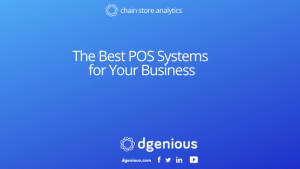
What sets businesses apart is not necessarily how many resources they have, but how well they use them. That being said, it’s easy to see why the most successful organisations are those that know how to make the most out of each resource.
And while there are countless resources you can maximise for better outcomes, today we’ll talk about one resource that every shop, store, boutique, or service provider has: the point of sales terminal.
If you’re puzzled by how a POS system can influence your success, then this article is definitely for you. By the time you finish reading it, you’ll understand why businesses that think their POS is just a payment mechanism are entirely wrong.
Because a POS terminal is so much more. In fact, its most valuable application is hidden underneath the surface — in the data it stores. With the help of POS reporting, this data can be transformed into decision-driving insights that can change the course of your business.
In this article, we’re going to dive deep into how you can use POS reporting to improve your business’s outcomes. But first, let’s understand why POS systems are so much more than payment tools and how POS reports are made.
The values of your POS system.
Think of your POS as a vault that guards invaluable business information. By opening it, you get access to insights that can empower you to optimise your efforts and increase profitability. But what type of information does it store and how can it help you?
Well, every purchase made through your POS is, in fact, a zoom in on your customers’ preferences. It’s also a reflection of your employees’ performance. Because, believe it or not, a mere transaction can offer answers to some of your biggest questions, such as:
- What do my customers want?
- What offers do they gravitate towards?
- Are my marketing strategies efficient?
- Are my employees presenting the right offers?
Of course, the answers are stored in data points that, on their own, hold little value. However, when put together in a wider context of trends, patterns, and behaviours, they reveal actionable insights that can aid your decision-making process.
In fact, when reported on correctly, the data from your POS can help you get a clearer picture of customer behaviour, inventory efficiency, employee satisfaction, and overall business performance. Equipped with this knowledge, you can then adjust your strategies and optimize for success.
So, while other businesses see POS terminals as mere payment systems, you can outperform your competition by looking deeper into the data your POS stores. And, to do that, you’ll need to understand POS reporting.
What is POS reporting and how are POS reports made.

POS reporting is an insights-generation practice that can empower you to make better business decisions. Simply put, POS reporting tracks data from your points of sales network and translates it into easy-to-read reports you can share with key decision-makers in your business.
But how?
This is where things get tricky, especially if you operate a complex network with different computer systems, profiles and needs. If this is the case, it goes without saying that you won’t be able to manually extract the reports.
Luckily, you won’t have to. POS reporting is, at its core, an automated process that can unify your data in a secure, dynamic way. Some of the most advanced reporting solutions can reconcile data in real time and correlate different systems, form your cash register to your stock, ERP, CRM, and more.
So, POS reports are automatically created based on what KPIs you wish to track. Speaking of which, let’s dive into the specific activities you can report on.
What activities can you report on?
You can create POS reports for almost all the activities your business performs, including sales, marketing, finances, logistics, and HR. Plus, since smart reporting tools such as dgenious can reconcile data from various departments and systems, you can mix and match different indicators to ensure you’re meeting your KPIs.
For example, you can track the most critical sales performance indicators by analysing multi-dimensional reports on sales by product, customer, brand, channel, and more. Not only that, but you can gain a deeper understanding of cross-selling initiatives, and even up-selling efforts, to make sure you’re running at full efficiency.
When it comes to your marketing KPIs, it’s essential to track and share your data efficiently. Luckily, with POS reporting, you can get more information on customers, products, marketing campaigns, and various online store KPIs. To account for the endless variables that can affect your marketing outcomes, make sure to choose a reporting solution that enables real-time viewing for a wide array of indicators and combinations.
Similarly, your finance, logistics, and HR KPIs can improve with POS reporting, as long as you use a solution that can reconcile various indicators. For example, you can balance costs by optimising logistics decisions. At the same time, you can boost employee satisfaction by rewarding your top-performing ones.
All in all, POS reporting can help you improve individual KPIs and drive your business’s overall performance.
5 essential POS reports to boost your business.

There are countless reports you can generate to derive business-worthy insights. Still, it’s always wise to start with the ones that can have the most immediate impact on your business. Having this in mind, we’ve outlined the 5 most important reports that can help you optimise your business and improve performance.
1. Sales Reports
Sales are the most critical indicator of how your business is doing. But what if they could also tell you what your business should be doing?
That’s what POS sales reports are for, and that’s why these should be among the first reports you generate. A POS sales report will feed you actionable insights on boosting your sales based on past purchases. More specifically, they will offer you information related to:
- Best selling products;
- Stale products;
- Days with most sales;
- Sales by shift/day;
- Sales by employee, department, location;
- Exchanged/returned products.
And, once you understand what the grounds for a successful sale are, you’ll be able to recreate those conditions and generate more revenue. Not only that, but you’ll also be more aware of your weaknesses and how to transform them into strengths.
2. Product Performance Reports
POS reporting’s power resides in the amount of details it can produce, and on its ability to integrate them within your network. So, while having a generic overview of sales is crucial, gaining more insights into what makes a product perform will optimise your strategy to minimise loss and maximise profit.
A POS product report can empower you with information such as:
- Product demand patterns, for you to adjust inventory as necessary;
- Products with high-return rates, which might indicate a flawed product;
- Top-performing discounted products, to leverage in your pricing strategy;
- Top performing products by vendor, which can lead to reordering your inventory.
These pieces of data will help you paint a clearer picture of demand and purchase power across your network, empowering you to make custom inventory decisions based on each vendor. After all, what works in one location might not work in another.
3. Inventory Reports
Keeping your inventory in line with customer demand will help you minimise warehouse costs, while making sure you always have the best performing products in stock. Needless to say, inventory control can’t be left to instinct, no matter how sharp your business sense is.
A POS inventory report will eliminate any second-guessing, offering a clear picture on what products to have in stock and what products to keep less of.
Basically, a POS report can help you:
- Know your inventory value with accuracy;
- Schedule reorders, by keeping an eye on product purchase patterns;
- Avoid out-of-stock situations, by knowing what your best-performing products are;
- Reduce warehousing costs, by optimising your product reorders.
Your POS terminal enables you to tap into overall patterns that can help balance inventory and in-detail trends that affect each product.
With dgenious, you can easily monitor your stocks with your real time sales.
4. Customer Reports
If you want to run a successful business, you must pace it to your customers’ rhythm. Because, when you draw the line, your sales depend on how well you know your audience.
So how much do you know about your consumers? Do you have enough insights into their habits, likes, and dislikes to create strong marketing initiatives? A POS customer report can give you all these answers and more, by empowering you with information on:
- VIP customers (Retention, Fidelity)
- VIP customer groups (Pareto, RFM)
- Underperforming customer groups
- Customers’ preferred payment method
- Customers’ preferred purchase days
The value of POS customer reports cannot be exaggerated. Based on their actionable insights, you can create effective loyalty programs and generate on-going repeat business. Plus, they can help you attract new clients by guiding you towards solving those specific problems that have stopped customers from purchasing from you in the past.
With dgenious, you can easily make lists of clients who didn’t came in one of your shop since 6 months, or who did buy a croissant last week but not yet this week.
5. Employees Reports
With POS employee reports, you can ease your management efforts to ensure you meet your HR KPIs, every time.
How? Two reasons. First, your POS contains data that can help you assess employee performance. Secondly, it can track shifts, meaning you can stay on top of employee hours without hassle.
Of course, the benefits don’t stop here. The more information you have about your employees, the better you’ll be at keeping them happy and productive. And POS systems contain tons of valuable employee details. The only thing left is using them to the best of your abilities.
Here are just a few of the benefits a POS employee report can offer:
- Keep track of shifts and worked hours;
- Assess employee performance based on sales made;
- Calculate commissions based on performance;
- Adjust shifts to boost sales.
Ready to leverage the power of POS reports?
If you want to gain a deeper understanding of what drives your business’ success, then POS reporting is a tool you shouldn’t overlook.
A solution such as dgenious can help you create easy-to-read POS reports with several levels of clearance. This way, each report will be visible only to those directly involved in the decision-making process, empowering them with insights that can lead to better outcomes.
Don’t hesitate to contact us for more details. Together we can discover countless POS reports that can help your business make the most out of its resources.



